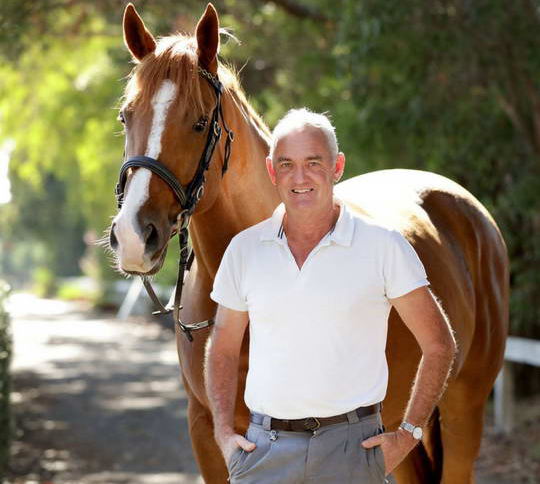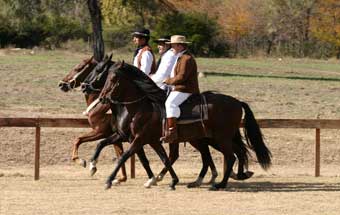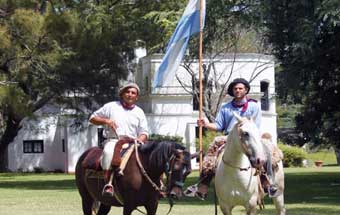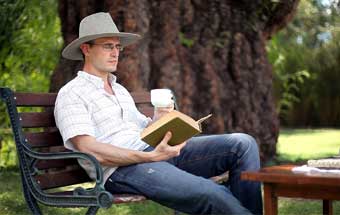Horse training: Interview with Andrew McLean
By: Pablo Imberti Posted: 23/01/2020
We have asked Andrew McLean

The interview is divided in three parts: the first one is about his person, the second one refers to the situation of professional horse training and the last one is about the question: Why does equitation science exist?
Below you can read our questions and McLean’s answers
Dr McLean, please tell us when and how your passion for horses arose?
My parents were very keen and capable horse people, and so I was sitting on a horse well before I can remember. I do love horses, but I have to say I love all animals equally. I’m just as intrigued by the hawk or the jellyfish. Living systems are truly amazing, and to my mind, behaviour and its origins are the most fascinating of all. Because I became so involved in horse sports and then finally studying horses from an academic point of view, I focused on them and I find them remarkable animals.
When and why did you decide to study the practice of horse training?
I decided to study training purely from the practical point of view when I was at university. I ‘broke -in’ horses to pay my way. However, the academic pursuit of training did not begin till I was in my 30’s.
Have you practiced competitive riding as a sport?
I have raced horses bareback, I have represented Australia in three-day eventing, I have ridden Show jumping to Grand Prix level dressage to Prix St George and trained to Grand Prix. When I was young you did everything, nowadays people tend to focus on just one thing.
Do you like riding in the countryside and going on horse riding holidays?
I really love riding in the countryside, it is a great way to experience nature. Last year I rode in Kenya and we covered 210 km in the Masai Mara. Here at home I ride on the beach as much as possible and frequently dolphins come to swim around the horses.
Do your family share your passion for horses?
My whole family shares my passion. My wife is a professional teacher of dressage, my daughter is my business manager and rides show (stadium) jumping, my two sons are both professional dressage riders and their wives also ride, one in dressage one show jumping. It is hard to avoid riding horses in our family, my father and my grandfather were also both show jump riders.
Would you like to be part of a group with an equestrian soul?
Join the Ampascachi Community. Obtain exclusive benefits for your holidays.
We tell you how to start, train and take care of your horse.
Interviews with direct providers of riding tours around the world.
Opinions of outstanding equine scientists and personalities in the equestrian sport world.
Have you ever been thrown off a horse and if so, could you manage to re-educate the horse?
Because I have spent my professional life re-educating problem horses, I have come off many times! I have broken quite a few bones however I have to say that since I started to adopt more accurate principles of Equitation Science, my injury rate dropped dramatically with difficult horses. At the Australian Equine Behaviour Centre which I developed in 1995, we had a very large caseload of horses for re-education, usually 120 per year and there were only two that we could not re-educate. Some horses however were too complex for their riders, and this is always the big question: does the horse match the rider?
Dr McLean, in your opinion, do professional horse trainers have sufficient knowledge on horses and do they integrate equine science in their training methods the proper way to obtain a well-trained horse?
Professional horse trainers learn their trade from handed-down knowledge, and while this is often very accurate the problem is that expert people are often unconsciously competent. This can make it difficult for others to learn from them. On top of this, the science of learning is much younger than the art of training. Every trainer on earth would do well to learn a sound knowledge of equine ethology and learning. This is what equitation science is about: the principles and processes of training that apply to every single method.
Do you think that the scientifically based knowledge on horse behaviour and the theories on horse training are spread widely enough in the equine world?
No, I think it is still very early days. Horses are still one are the most dangerous animals in the western world, and horse training one of the most dangerous activities. This can be dramatically reduced with more knowledge.
Why are there so many different ways of taming and training horses worldwide?
This is because people learn the trade by handed-down knowledge. It is also influenced by the way that the horse has been used in various cultures.
Should there be official university careers for professional horse tamers and trainers?
I personally believe that every horse person should learn the theory of training animals not only for their own safety but for ethical reasons of animal welfare.
What advice would you give to a young person who wants to be a professional horse trainer? What should they be aware of and how to start with?
I would tell them to get some education. I run a Government accredited Diploma course on training, and I think undertaking a course such as this gives people, no matter what method they choose to use and no matter what discipline of riding they undertake, a greater chance of success by far.
We know that you are one of the founders of ISES (International Society for Equitation Science), would you tell us about the theories and ideas, their programs to spread this knowledge and what the aims are?
We are a group of scientists, veterinarians and ethologists whose research focuses on horses and training. We decided to make a scientific society back in 2004, and every year since then we have had a conference in various countries throughout the world. So far we have had over 1200 papers presented to the society for oral or poster contributions at conferences, so the science here is really booming. Our aims include both education and welfare. Our website is www.equitationscience.com and it contains information including training principles.
What is the learning theory of horses and how is it linked to ethology?
Ethology includes all of the horse’s inherited behaviours including its propensities for learning. Learning theory is the body of knowledge that contains operant conditioning, classical conditioning and habituation. Within those topics is the detailed information of how pressure release works such as the aids, the voice commands, all horse-human interactions, it explains why things go right and why things go wrong and it includes all of the techniques for desensitising horses to stimuli that they normally are frightened of.
Subscribe to the Ampascachi Community and obtain benefits and exclusive content. Furthermore, we offer free advice on horses and equestrian tourism.
The techniques of horse training based on equine theories and ethology; how do they differ from the trainers of the “New Age” as you call them in your book “The truth about horses”?
The techniques are largely no different, the difference is in the detail of how pressure-based aids are used and the proper timing. There are some techniques that are used by ‘New Age’ trainers that are problematic and not good for the horse’s welfare or human safety and these include techniques that encourage flight response. To my mind equitation science lifts the murky veil and the glass ceiling that prevents ordinary people from learning how to effectively train their horse. It gives them good step-by-step information, and basically brings horse training into the 21st-century of objective knowledge about horses. When you think about it, every other area of human endeavour is modernised and understood in logical ways. Horse training is the last realm to shed the light of scientific thinking on.
Within the world of horse riding and competitive horse riding, do you think the training of horses mainly follows the principles of ISES?
Within the horse world, there are so many different methods and they variously follow the principles of equitation science. Some more so than others, but very few indeed follow the precise principles of learning which to me is surprising, because tapping into learning processes is the ultimate way to achieve the highest level of success in any discipline. It’s like if you want to build the fastest car, you should use the most modern understanding of engineering. All animal processes are explicable in scientific terms: brains and nerves are simply very sophisticated wiring systems. The more you know the better, however people are often afraid of knowledge in case it turns the world upside down. For me, I relish knowledge.
What is your opinion on the humans as the leader of the horse and what does that mean for their training?
I think is important that trainers are very clear and consistent in the training and perhaps that means to be assertive. However, horses do not see people as leaders, because in the wild they don’t see horses as leaders either – there are no studies that support this view. All the studies of feral horses show that there are no leaders. The horse that moves to the waterhole causes the others to follow and it is usually a lactating mare whoever else is thirsty! The idea of leadership came about after the idea of been dominant over horses.
Dr. McLean, you have gained a lot of experience with horses, what are the 5 to 10 most important things to have in mind for a correct training of horses to assure a pleasant and safe interaction between horse and human?
- Remember it is the release of pressure that trains the horse.
- duce pressures to light aids.
- Ensure that he is well behaved on the ground entry into standstill when needed.
- Learn to ride horses such that your body moves perfectly with the horse and does not inhibit him.
- Do not use reins and legs at the same time.
- Make sure your aids are as easily deciphered by the horse as possible.
- Each aid should have only one response.
- Avoid punishment and in particular never punish for non-compliance.
- Coupled with praise, rub the horse’s withers to reward him frequently.
- Avoid keeping him alone, horses are social animals and need social contact.
We would especially like to thank Dr Andrew McLean who has been so gentle to respond our questions and we hope that his answers are as useful to our readers as they are to the Ampascachi team. Thank you very much!
Are you passionate about horses, too? Do you want to learn how to train them?
Download our free eBook Horse training step by step. When you see how your horse learns and begins to understand your signs and aids, you will be filled with joy.
And if you want to be a professional horse trainer and get field-based training, you should check out our training program. You will have the opportunity to live in our equestrian centre and experience our full training process with young horses.
~
THIS COULD ALSO BE INTERESTING

Gaited Horses: Horses with a "Special Gait"
The basic gaits of most horse breeds are the walk, the trot and the canter or gallop. But other breeds have a special ambling gait which is more comfortable to ride than the trot.

Argentina: Tourism and horseback riding
Argentina is known for being a vast land, its natural beauties and culture. Trail riding tours in this country are a unique, unforgettable experience.

Improve your leadership qualities with horses
Being with horses gives us positive feelings, increases our self-esteem, improves our understanding of body language and empowers our confidence that we can reach our goals.
~
WHAT IS YOUR OPINION? LEAVE A COMMENT
Your comments
Like most horse trainers, he is correct on several points, and completely wrong on others. I have over 60 years experience with horses and horse training and ,while I enjoyed the article, I believe the Dr. has more to learn ! ......as we all do.
It is my preference to say that any culture is separate from people and animals tend to unite people to its particular culture. Today, horses are owned and often a source of leisure. That modern idea of animal husbandry brings in the time when horses were no longer wild packs running free and were required to serve, mostly desired by all cultures as a transportation vehicle for its speed, strength, and stamina over and above the distance a person is able to walk and so slowly at that is the person in need not the horse. With that being said, it makes sense how cultures feel it wants to lead a horse to work for human beings. That coaxing is by trust alone. And, only in-person, and as much as possible, is what Native cultures discover, still, which might be more valued in the coveted horse rider relationship than science, research, and method is ever able to produce.
Article provides a generalized method of pursuing training of a horse. While it lacks specificity, it tries to show the positive side of training. The problem with this article is it does not demonstrate the effects of training or lack thereof. It does not identify whether training is progressive or linear. It basically says training is training.
To Fred, -as so many horse people you think because you have so many years doing the same things wrong you have the right way....problem with horse people you fail to accept any other way than your own
I think horse people need to make changes in their attitude. They need the help of professionals and just because they have been doing things for years does not make them right, nor an expert. Stop putting your ego ahead of the welfare of the horse!
Excellent interview and I enjoyed reading it. I wonder whether Fred Zara managed to ride cross country for his country, train and ride showjumpers at Gran Prix and dressage at Prix St George level, not to mention race bareback for a living. It is rare to see such a well rounded humble horseman. I think we can all learn from Andrew.
Planning your horse riding holidays?
Join the Ampascachi Community. You will get exclusive advantages and guidance for your next horse riding holiday.


 German
German French
French Spanish
Spanish
MESSAGE TO OUR READERS
The content creation team at Ampascachi Horse Riding Holiday would like to thank our readers who have written a comment on this interview with Andrew McLean.
We would like to clarify that the content creation team does not make comments or judgements on the answers of the interviewed person.
In this case we solely publish the opinions of our blog readers about the concepts of the interview, whenever they do not offend the interviewed person.
Thank you again for your comments.